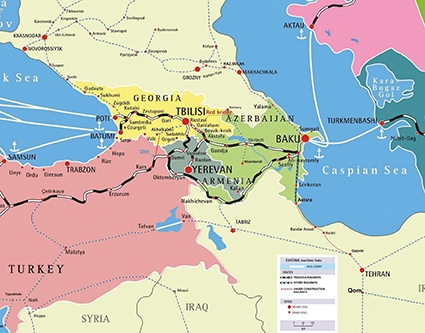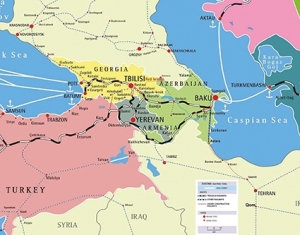Economic Development as a Recipe for Georgia’s Geopolitical Security
OP-Ed
The West has geopolitical interests across the former Soviet space, and so does Russia. Russia is weaker economically, and in terms of soft power, than the EU or the US, but this disadvantage is covered up by Russia’s geographic proximity to the South Caucasus, Ukraine, Central Asia and elsewhere. These factors create what we have had for the past 25 years – a battle for the post-Soviet economic markets.
Countries lying in between feel the pressure the most, and it has become customary for analysts to discuss ways to resolve the geopolitical conflict. One of the possibilities for establishing a safer zone in the post-Soviet space could be a diversification of economic partnerships. The more foreign countries invest in Georgia, the easier it will be for Tbilisi to navigate in the difficult geopolitical currents of the South Caucasus.
The country needs to be not only the embodiment of EU/US economic interests, but also be open to large infrastructure projects sponsored by any interested state. This could potentially create a network of economic corridors, supply chains, etc. which will make Georgia less vulnerable to both Russian and other outside pressure.
Georgia has an attractive geographic position and using it will create powerful incentives for development. Consider the following example: Georgia is actually the shortest distance to transport goods overland between China and Europe. True, the cost of using the Georgia route is significantly higher than the corridors from China through Russia and Kazakhstan. Nevertheless, using the Georgia route is quite attractive.
Important steps have been made to attach Georgia to regional and global projects. One of them is the Belt and Road Initiative (BRI), first announced in 2013. Georgia became directly involved in BRI in 2016 by joining the Asian Infrastructure Investment Bank (AIIB). Recently, Georgia signed an agreement under which the AIIB will provide $114 million to build the Batumi Bypass Road- facilitating a better connection between Georgia’s hinterland and the port city of Batumi.
Anaklia’s Importance
The Georgian government in the near future plans to construct approximately 550 kilometers of roads as well as repair hundreds of kilometers. Moreover, $3.5 billion will be spent on 300 new bridges and 50 new tunnels. The connectivity across the country will be much facilitated, in particular to the new port at Anaklia.
The port of Anaklia is interesting as the current ports of Georgia can service only ships with small and medium draft. The depth of the harbor in Poti is 8 meters, in Batumi – 14 meters. The new port of Anaklia will have a depth of 17 meters and will be able to accommodate large Panamax and Postpanamax container vessels, each carrying up to 10,000 TEU.
Baku-Tbilisi-Kars
Yet another project of importance is the the newly opened Baku-Tbilisi-Kars railway, effectively connecting the Caspian with the Black Sea. The railway will play an important role in the geopolitics of the region as it will not only increase connectivity in the South Caucasus but could also potentially embolden the land-locked Central Asian states to think more actively about exporting their raw resources to the European markets. This is also reflected in the intention behind the construction of the port at Alat in Azerbaijan, which is one of the largest in the Caspian Sea region, and which was specifically built to provide connections to Central Asia.
An additional layer of geopolitical importance is added to the project when it is seen within the context of the Chinese Belt and Road Initiative (BRI). The 826-kilometer railway will enable the delivery of cargo between China and Europe in approximately two weeks. Up to 8 million tons of cargo may be carried on the Baku-Tbilisi-Kars railway by 2025.
We often hear that Georgia should embrace neutrality on an official level as a recipe for geopolitical security. However, statements will not change anything until bigger neighboring states agree on it.
One of the ways to ensure your own security is to be firmly connected to constantly changing global supply chains and to have developed infrastructure. The more states have their share of economic benefits in Georgia, the more it is possible that Georgia’s position will become more stable and less attractive for aggression from its neighbors.
Emil Avdaliani












